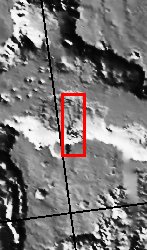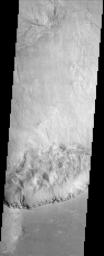Ganges Chasma Landslide
Caption:

(Released 01 April 2002)
This image shows a spectacular landslide along a portion of the southern wall of Ganges Chasma within Valles Marineris. Landslides have very characteristic morphologies on Earth, which they also display on Mars. These morphologies include a distinctive escarpment at the uppermost part of the landslide--called a head scarp (seen at the bottom of this image), a down-dropped block of material below that escarpment that dropped almost vertically, and a deposit of debris that moved away from the escarpment at high speed. In this example, the wall rock displayed in the upper part of the cliff is layered, with spurs and chutes created by differing amounts of erosion. Below the steep scarp is a smoother, steep slope of material with small, narrow tongues of debris that have eroded off of the escarpment since the landslide occurred (a talus slope). The actual landslide deposit, visible in the upper half of this image, shows striations that form by differences in the side-by-side motion during high velocity emplacement. This immense landslide traveled some 70 km at speeds that probably exceeded 100 kilometers per hour (60 miles per hour) before coming to rest, forming abrupt, terminal fronts (upper right corner of image). Even at these high speeds, this massive landslide was moving for nearly an hour before it came to rest.
Cataloging Keywords:
| Name |
Value |
Additional Values |
| Target |
Mars |
|
| System |
|
|
| Target Type |
Planet |
|
| Mission |
2001 Mars Odyssey |
Mariner |
| Instrument Host |
Mars Odyssey |
|
| Host Type |
Orbiter |
Flyby Spacecraft |
| Instrument |
Thermal Emission Imaging System (THEMIS) |
|
| Detector |
|
|
| Extra Keywords |
Grayscale |
| Acquisition Date |
|
| Release Date |
2002-05-21 |
| Date in Caption |
2002-04-01 |
|
| Image Credit |
NASA/JPL/Arizona State University |
| Source |
photojournal.jpl.nasa.gov/catalog/PIA03759 |
| Identifier |
PIA03759 |


